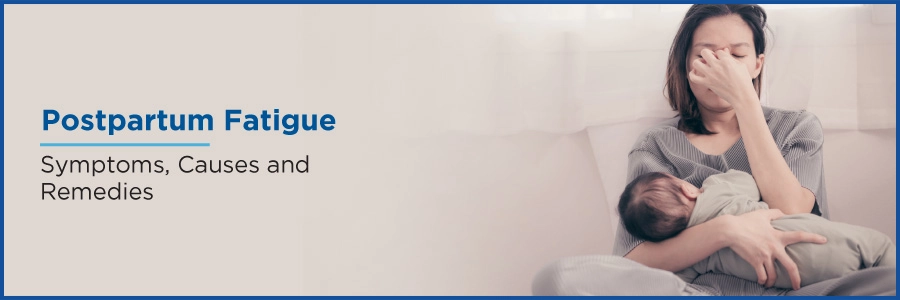
The Postpartum Journey: Managing Fatigue After Childbirth
The postpartum journey of a woman can be a battle with smiles and frowns, ups and downs, excitement and weaknesses. There will be times when you feel overwhelmed with everything going on around you. At other times, you might feel stressed taking care of your baby and yourself, but do remember that this too will pass and you’ll soon be yourself again. You must prioritize your mental and physical health because only a happy mommy can keep her baby happy. In between all these, a woman might feel extremely weak and fatigued after having a new baby, which is also known as post-partum fatigue.
Generally, polyps are very small in shape and show fewer or no symptoms. That is why it is a matter of serious concern. In order to prevent colon cancer, one has to undergo regular screening for overall good health, especially if someone has a family history of cancer.
What is Postpartum Fatigue?
Postpartum Fatigue (PPF) is a physical and mental health illness that affects women after giving birth, characterized with persistent lack of energy and impairments in concentration. For some mothers, experiencing the "baby blues" for a few weeks after giving birth is normal.
After giving birth, many women experience mood swings. They can be cheerful one minute and downhearted the next. Even while the baby is napping, they may feel unhappy, have problems concentrating, lose their appetite, or may have trouble sleeping.
If you're a new mother and you're experiencing any of these symptoms, you might be suffering from the baby blues. The baby blues are a common symptom of new motherhood and usually go away within 10 days after delivery.
Symptoms of Postpartum Fatigue:
Although many women get fatigued right after childbirth, some women don’t begin to feel depressed until several weeks or months later. There are various symptoms such as:
- Feeling sad or down often
- Frequent crying or tearfulness
- Feeling restless, irritable, or anxious
- Loss of interest in anything
- Loss of appetite
- Less energy and motivation to do things
- Feeling worthless, hopeless, or guilty
- Unexplained weight loss or gain
- Feeling like life isn’t worth living
In rare cases, a woman may also suffer from postpartum psychosis. This is a life-threatening condition.
Causes of Postpartum Fatigue
The exact cause of fatigue after delivering the baby isn’t known. Hormone levels change during pregnancy and right after delivery. Those changes in hormones may cause chemical changes in the brain and this can lead to depression.
- Severe premenstrual syndrome (PMS)
- A stressful marriage or family relationship
- Stressful life journey during pregnancy or after childbirth
How to Fight Fatigue?
When you feel fatigued, you might also feel weak, tired, sleepy, or dizzy. Exhaustion can also make you feel like giving up on breastfeeding. It can even impact your stress levels, your ability to function, and even your relationship with your baby. Here are some tips for fighting fatigue after giving birth.
Secure your health with a second opinion. Make informed decisions and book your appointment today!
Get A Second OpinionSeek Rest and Comfort
Be comfortable as you can when you're feeding your baby like sitting with your feet up or breastfeeding in a side-lying or laid-back nursing posture. Use pillows or cushions to support your arms so that you don't have to put in more effort. Always remember: this fatigue you are feeling is temporary!
Prioritize Nutrition
Keep your energy levels up by eating a nutritious, well-balanced diet, when you're recovering from giving birth. You should also continue to take your prenatal vitamins until you feel back to yourself or until your doctor advises you to stop.
Sleep when the baby sleeps
You should take a proper sleep when the baby naps. Even if you just lie down for 15 minutes during your baby's naps, you will feel better. One of the best things you can do for your health is to follow this sage advice.
Check in with your doctor
Seek help if you feel you're suffering from the baby blues or postpartum fatigue. If your fatigue seems excessive, check with the doctor to make sure it doesn't have a hidden physiological cause.
Take care of yourself
After welcoming the baby, you might be busy taking care of the baby, but don't forget to take care of yourself too. Eat right, take proper sleep, exercise when you can, drink plenty of water (dehydration can lead to more fatigue) and most importantly, enjoy your baby!
We, at Medicover Woman and Child Hospitals, are the country’s leading and most trusted maternity hospital, both for the mother as well as for the child. We offer patients the highest quality care and cutting-edge maternity treatment by top doctors & gynecologists.
Citations:
What is postpartum fatigue?Factors associated with maternal postpartum fatigue: an observationalstudy
Potential Postpartum Complications
Postpartum Depression
What is postpartum fatigue?
Sleep and tiredness after having a baby
